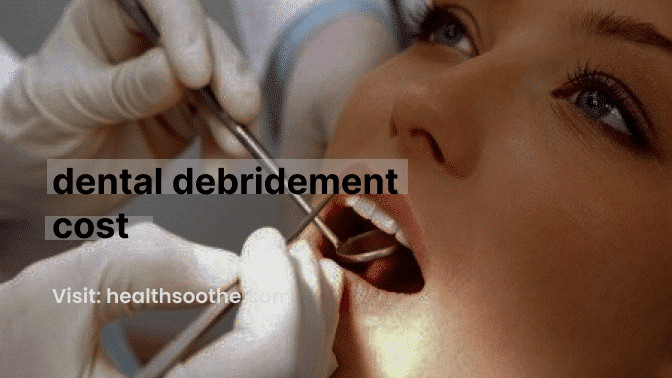Dental debridement is a dental procedure that involves the removal of plaque, tartar, and other debris from the teeth and gums. This procedure is necessary for maintaining good oral health and preventing more serious dental problems from developing. However, the cost of dental debridement can vary depending on several factors, including the type of procedure, the region or country, and the dentist’s experience and expertise.
In this article, we will explore the various aspects of dental debridement cost, including factors that affect the price, the average cost in different regions and countries, and alternatives to debridement for maintaining good oral health. We will also discuss the importance of dental insurance for covering debridement costs and provide tips for preventing the need for frequent dental debridement.
What is Dental Debridement?
Dental debridement is a procedure that involves the removal of plaque, tartar, and other debris from the teeth and gums. This procedure is necessary for maintaining good oral health and preventing more serious dental problems from developing, such as gum disease, tooth decay, and tooth loss.
There are two types of dental debridement: scaling and root planing. Scaling involves the removal of plaque and tartar from the teeth and gum line, while root planing involves the removal of plaque and tartar from the root surfaces of the teeth. Both procedures are typically performed under local anesthesia and may require multiple visits depending on the severity of the dental condition.
Why is Dental Debridement Necessary?
Dental debridement is necessary for maintaining good oral health because it removes the buildup of plaque, tartar, and other debris that can lead to more serious dental problems. Plaque is a sticky film of bacteria that forms on the teeth and gum line, and if not removed, it can harden into tartar, which is more difficult to remove.
Tartar buildup can lead to gum disease, which is a serious condition that can cause tooth loss and other health problems. Gum disease can also increase the risk of other health problems, such as heart disease and diabetes. By removing plaque and tartar, dental debridement can help prevent these health problems from developing and maintain good oral health.
Read Also: Dental ADA Codes 2023: Current Dental Terminology
How Much Does Dental Debridement Cost?
The cost of dental debridement can vary depending on several factors, including the type of procedure, the region or country, and the dentist’s experience and expertise. In the United States, the cost of scaling and root planing can range from $500 to $1,000 per quadrant, depending on the severity of the dental condition.
Factors Affecting the Cost of Dental Debridement
Several factors can affect the cost of dental debridement, including:
- Type of Procedure: Scaling and root planing are typically more expensive than routine dental cleaning because they require more time and expertise.
- Region or Country: The cost of dental debridement can vary depending on the region or country. In the United States, dental debridement is typically more expensive than in other countries.
- Dentist’s Experience and Expertise: The cost of dental debridement can also vary depending on the dentist’s experience and expertise. Experienced dentists may charge more for their services.
Average Cost of Dental Debridement in Different Regions/Countries
The cost of dental debridement can vary depending on the region or country. In the United States, the cost of scaling and root planing can range from $500 to $1,000 per quadrant, depending on the severity of the dental condition. In other countries, such as Mexico and Costa Rica, dental debridement can be significantly less expensive, with prices ranging from $100 to $400 per quadrant.
How to Find Affordable Dental Debridement Options
Finding affordable dental debridement options can be challenging, especially for those without dental insurance. However, there are several options available for those looking to reduce the cost of dental debridement:
- Dental Discount Plans: Dental discount plans are an affordable alternative to traditional dental insurance. These plans offer discounted rates on dental services, including dental debridement.
- Dental Schools: Dental schools often offer discounted rates on dental services, including dental debridement. However, it is important to note that these services are provided by dental students under the supervision of licensed dentists.
- Non-Profit Organizations: Non-profit organizations, such as Mission of Mercy and Remote Area Medical, offer free or low-cost dental services to those in need, including dental debridement.
- Government Programs: Some government programs, such as Medicaid and CHIP, offer dental coverage for eligible individuals, including dental debridement.
Importance of Dental Insurance for Covering Debridement Costs
Dental insurance can be an important tool for covering the cost of dental debridement. Many dental insurance plans cover all or a portion of the cost of debridement, depending on the plan and the severity of the dental condition. It is important to review the dental insurance plan to understand what is covered and to ensure that the dentist is in-network to avoid any unexpected costs.
Alternatives to Dental Debridement for Maintaining Good Oral Health
There are several alternatives to dental debridement for maintaining good oral health, including:
- Brushing and Flossing: Brushing and flossing regularly can help remove plaque and prevent tartar buildup.
- Regular Dental Cleanings: Regular dental cleanings can help prevent the need for frequent dental debridement by removing plaque and tartar buildup before it becomes a problem.
- Mouthwash: Mouthwash can help kill bacteria in the mouth and prevent plaque buildup.
Tips for Preventing the Need for Frequent Dental Debridement
Preventing the need for frequent dental debridement can help reduce the cost of dental care. Here are some tips for preventing the need for frequent dental debridement:
- Brush and Floss Regularly: Brushing and flossing regularly can help prevent plaque buildup and reduce the need for frequent dental debridement.
- Maintain a Healthy Diet: A healthy diet can help prevent the development of dental problems, such as tooth decay and gum disease.
- Avoid Smoking and Tobacco Products: Smoking and tobacco products can increase the risk of dental problems, such as gum disease and tooth decay.
- Schedule Regular Dental Cleanings: Regular dental cleanings can help prevent the need for frequent dental debridement by removing plaque and tartar buildup before it becomes a problem.
Potential Risks and Complications of Dental Debridement
Dental debridement is generally safe, but there are potential risks and complications, including:
- Pain or Discomfort: Dental debridement can cause pain or discomfort, especially during the procedure.
- Bleeding: Dental debridement can cause bleeding in the gums, especially if the gums are inflamed or infected.
- Infection: Dental debridement can increase the risk of infection, especially if the gums are inflamed or infected.
- Damage to Teeth or Gums: Dental debridement can cause damage to the teeth or gums if not performed properly.
Conclusion
Dental debridement is an important dental procedure for maintaining good oral health and preventing more serious dental problems from developing. The cost of dental debridement can vary depending on several factors, including the type of procedure, the region or country, and the dentist’s experience and expertise.
However, there are several options available for those looking to reduce the cost of dental debridement, including dental discount plans, dental schools, non-profit organizations, and government programs. Dental insurance can also be an important tool for covering the cost of dental debridement.





